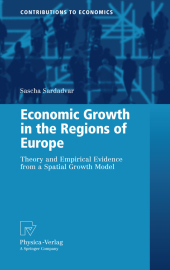 Neuerscheinungen 2013Stand: 2020-01-07 |
Schnellsuche
ISBN/Stichwort/Autor
|
Herderstraße 10
10625 Berlin
Tel.: 030 315 714 16
Fax 030 315 714 14
info@buchspektrum.de |

Sascha Sardadvar
Economic Growth in the Regions of Europe
Theory and Empirical Evidence from a Spatial Growth Model
2013. xii, 140 S. 6 Tabellen. 235 mm
Verlag/Jahr: PHYSICA-VERLAG 2013
ISBN: 3-7908-2830-0 (3790828300)
Neue ISBN: 978-3-7908-2830-6 (9783790828306)
Preis und Lieferzeit: Bitte klicken
Although interest in spatial growth regressions has been growing in recent years, formal theoretical approaches that acknowledge the role of space in economic growth have been sparse. In particular in a regional context, the assumption of independent, non-interacting closed economies can lead to misinterpretations. This book fills the void by discussing neoclassical growth theory in a spatial context, in order to examine growth both theoretically and empirically in a system of N regional economies. A formal model is presented that allows for interregional fixed capital relocations, which are in turn determined by the economies´ relative locations in space. It is shown how initial endowments with human capital play a decisive role regarding the evolution of output, and how both convergence and divergence processes may occur. Using a spatial econometric model specification, the theoretical model is tested empirically for 255 European regions.
1 Introduction.- Part I: Theory of Economic Growth.- 2 Neoclassical Growth Theory and Standard Models.- 3 Growth Models with Spatial Externalities.- 4 Convergence: Theory and Evidence.- Part II: A Model of Regional Growth.- 5 Remarks on Regional Growth.- 6 Structure of the Model.- 7 Evolution of Factors and Output.- 8 Implications for Output Growth.- Part IV: Empirics.- 9 Regions, Variables and Data.- 10 Spatial Econometric Specification and Estimation.- 11 Testing the Theoretical Model.- Summary
From the reviews:
"The author introduces a spatial dependence component into the theoretical formulation of a neoclassical growth model and then provides an empirical application to European regions. ... I greatly enjoyed reading this book. The theoretical model is well structured and provides a plausible interpretation of the dynamics of an economic system organised into sub-national units such as regions. ... this book is very good reading for anyone interested in regional growth models and the convergence hypothesis." (Davide Piacentino, Scienze Regionali, Vol. 11 (2), 2012)


